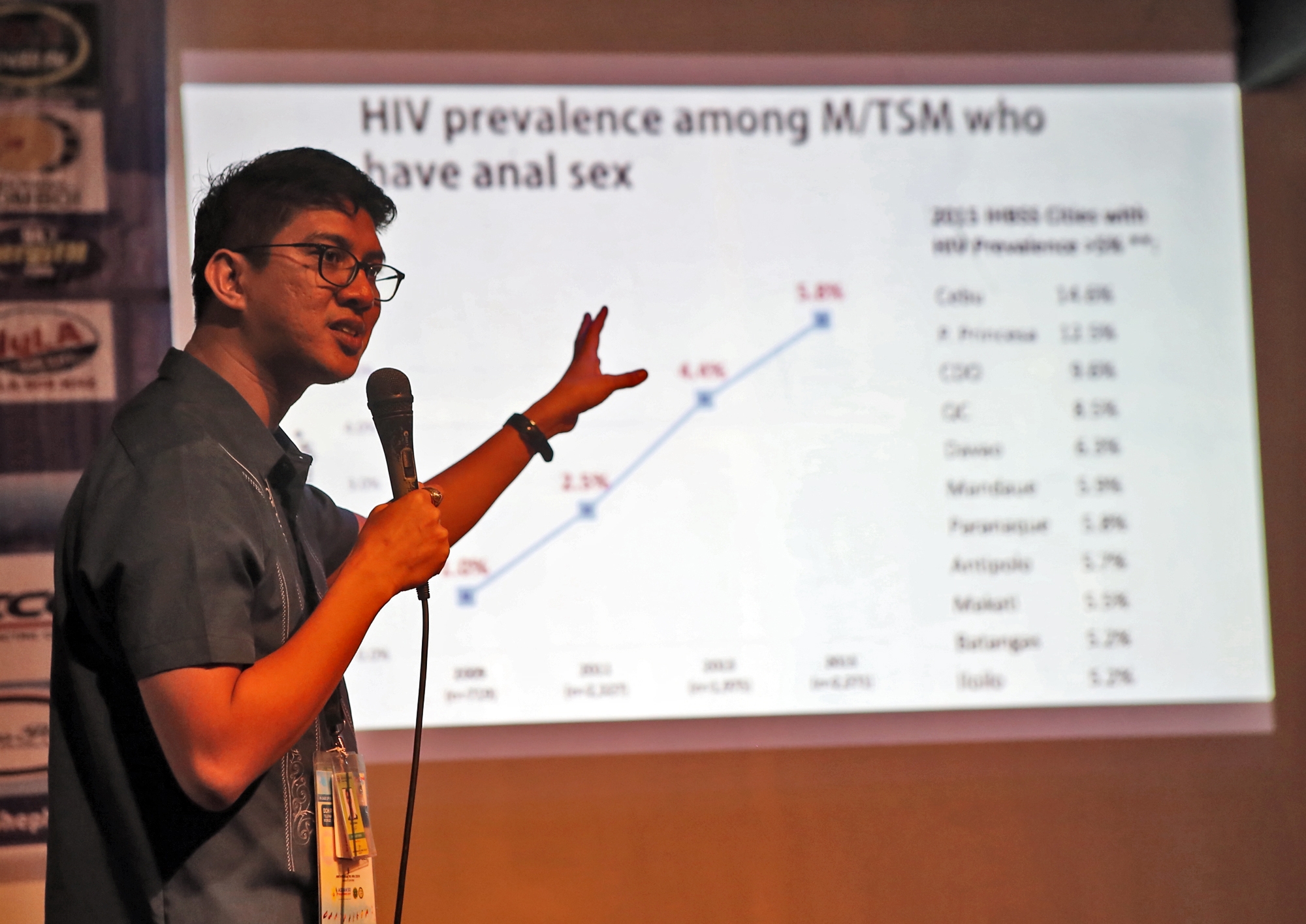
Dr. Van Phillip Baton, coordinator of Re-Emerging Infectious Disease Program of Department of Health in Central Visayas (DOH)-7, discusses human immunodeficiency virus infection and acquired immune deficiency syndrome (HIV-AIDS) in a forum, an activity which is part of the Cebu Press Freedom Week celebration(CDN PHOTO/JUNJIE MENDOZA)
Cebu City ranks 1st in prevalence rate study of men having sex with men transmission of HIV
The Department of Health is intensifying its ABCDE program, an education campaign on the human immunodeficiency virus infection and acquired immune deficiency syndrome (HIV/AIDS) especially in Cebu City which ranked first in the country in terms of prevalence of HIV/AIDS through men having sex with men (MSM) transmission.
Dr. Van Phillip Baton, coordinator of Re-Emerging Infectious Disease Program of Department of Health (DOH) 7, said the department is strengthening the ABCDE (Abstinence; Be Mutually Faithful; Consistent use of Condom; Do not Abuse Alcohol or share needle; and Education) program to help control the increase in HIV/AIDs cases in the city.
Baton said the HIV/AIDS MSM data, however, were based on DOH’s 2015 Integrated HIV Behavioral and Serologic Surveillance (IHBSS) which was conducted in different cities.
The study showed that Cebu City had the highest prevalence rate of people getting HIV/AIDS through MSM at 14.6 percent, followed by Puerto Princesa in Palawan with 12.5 percent and Cagayan de Oro City with 9.6 percent.
There were at least 300 patients involved in the study, said Baton, who was the keynote speaker on the HIV and AIDS symposium organized by Kapisanan ng mga Brodkaster ng Pilipinas (KBP), in celebration with the Broadcaster’s Month and Press Freedom Week 2017 yesterday held at Marcelo Fernan Press Center in Sudlon, Lahug, Cebu City.
Access to information
Baton said that the lack of access and information on the use of contraceptives, specifically condom, is the main reason for risk of a person acquiring HIV/AIDS through MSM.
“Some of them don’t use condom because they don’t like the feeling of using one, their partner’s has objected, they forgot to use it while others doesn’t know how to use it and they say it’s expensive,” said Baton.
Modes of transmission
Aside from MSM, HIV/AIDS is also transmitted through sexual intercourse, blood transfusion and through intravenous drug use.
To address this issue, DOH-7 is also coordinating with different community-based organizations to help them convince more people to undergo HIV testing, especially those who are sexually active people.
Baton said that it is important to undergo HIV testing, so that they could identify those infected with the disease and could be enrolled into an antiretroviral treatment so that the patient could not infect people anymore.
Treatment hubs
In Central Visayas, the HIV/AIDS treatment hubs are Vicente Sotto Memorial Medical Center in Cebu City, Gov. Celestino Gallares Memorial Hospital in Tagbilaran, Bohol, and Cebu Social Hygiene Clinic as satellite treatment hubs in Barangay Carreta, Cebu City.
Meanwhile, Dr. Helen Madamba, an expert in Obstetrics and Gynecology/Infectious Disease department, said there were 23 pregnant patients this year who had HIV and were treated at the (VSMMC).
Madamba said the figure is higher compared to the 18 pregnant HIV patients treated at the hospital last year.
She said that it is important for these patients to undergo treatment to make sure that their babies would not be infected with the disease.
She also said that most patients did not know they had HIV until they went through the tests.
“Most of them don’t know about their situation till they undergo HIV testing. They also found out that they got the disease from their partner who were majority are drug users,” Madamba said.
Scary trend
She also described the fast increase in the number of HIV/AIDS cases in the country as really scary.
She advised the younger generation to make sure that they and their partners don’t have any disease first before engaging in sex to avoid getting HIV or any sexually transmitted diseases.
According to the DOH, there are already 40,717 HIV cases and 4,306 AIDS cases in the country since 1984.
Of that number, 2,185 have already died because of the disease.
The DOH has also ranked Central Visayas fourth among the regions in the country with the highest cases of HIV/AIDS.